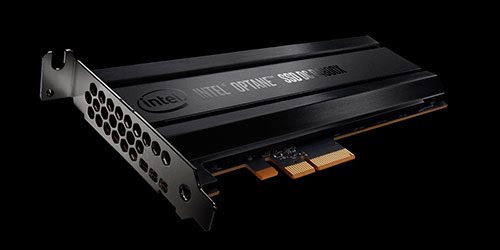March has been a busy month for Intel’s storage division.
Last week, the chipmaker launched its DC P4800X, an Optane-based PCIe solid-state drive (SSD) for servers. Optane is a memory architecture intended to bridge the performance gap between storage and DRAM.
In the case of the DC P4800X, it provides 375GB of capacity that appears as DRAM to operating system software and applications. According to Intel’s testing, the SSD can deliver read and write input/output operations per second (IOPS) ratings of up to 550,000 and 500,000, respectively. Latency is rated at under 10 microseconds.
Jack E. Gold, founder and principal analyst at J. Gold Associates, isn’t expecting Intel to use Optane to directly compete with flash drives.

“Rather, we expect Optane to be priced on a per byte basis between DRAM and NAND flash,” said Gold in a research note sent to InfoStor. “As a result, we estimate Optane based SSDs will initially be priced at a 50 percent to 75 percent premium compared to SSD equivalent devices, although on a price/performance basis, Optane will be a better value for process intensive applications,” including big data, analytics, virtual reality, artificial intelligence and other demanding workloads.
Optane won’t be unseating the current crop of SSDs any time soon, added Gold.
“While many have focused on Optane’s ability to take market share away from traditional NAND storage devices, we believe that is missing the point. The true advantage of Optane, once machines are properly designed/configured for its unique capabilities, is that it can significantly increase performance and act as a processing accelerator,” he said.
On the PC front, Intel this week debuted its new Optane Memory modules. Available in 16GB and 32GB capacities when they ship on April 24, the M.2 boards aren’t meant to replace hard disk drives (HDDs), but rather act as a high-speed cache.
“With the increased speed and responsiveness of Intel Optane memory in a 7th Gen Intel Core processor-based system, you can power on your computer up to twice as fast and improve overall system performance up to 28 percent faster with storage performance up to 14x faster,” wrote Navin Shenoy, senior vice president and general manager of the Client Computing Group at Intel, in a March 27 announcement. “Applications like Microsoft Outlook will launch up to nearly 6x faster, the Chrome browser launches up to 5x faster, games launch up to 67 percent faster, and levels load up to 65 percent faster.”
Intel Optane Memory modules require seventh-generation Intel Core “Kaby Lake” processors and motherboards with compatible chipsets. In the second quarter, HP, Dell and other vendors will begin offering commercial and consumer PCs with the technology, added Shenoy.
Pedro Hernandez is a contributing editor at Datamation. Follow him on Twitter @ecoINSITE.
Ethics and Artificial Intelligence: Driving Greater Equality
FEATURE | By James Maguire,
December 16, 2020
AI vs. Machine Learning vs. Deep Learning
FEATURE | By Cynthia Harvey,
December 11, 2020
Huawei’s AI Update: Things Are Moving Faster Than We Think
FEATURE | By Rob Enderle,
December 04, 2020
Keeping Machine Learning Algorithms Honest in the ‘Ethics-First’ Era
ARTIFICIAL INTELLIGENCE | By Guest Author,
November 18, 2020
Key Trends in Chatbots and RPA
FEATURE | By Guest Author,
November 10, 2020
FEATURE | By Samuel Greengard,
November 05, 2020
ARTIFICIAL INTELLIGENCE | By Guest Author,
November 02, 2020
How Intel’s Work With Autonomous Cars Could Redefine General Purpose AI
ARTIFICIAL INTELLIGENCE | By Rob Enderle,
October 29, 2020
Dell Technologies World: Weaving Together Human And Machine Interaction For AI And Robotics
ARTIFICIAL INTELLIGENCE | By Rob Enderle,
October 23, 2020
The Super Moderator, or How IBM Project Debater Could Save Social Media
FEATURE | By Rob Enderle,
October 16, 2020
FEATURE | By Cynthia Harvey,
October 07, 2020
ARTIFICIAL INTELLIGENCE | By Guest Author,
October 05, 2020
CIOs Discuss the Promise of AI and Data Science
FEATURE | By Guest Author,
September 25, 2020
Microsoft Is Building An AI Product That Could Predict The Future
FEATURE | By Rob Enderle,
September 25, 2020
Top 10 Machine Learning Companies 2021
FEATURE | By Cynthia Harvey,
September 22, 2020
NVIDIA and ARM: Massively Changing The AI Landscape
ARTIFICIAL INTELLIGENCE | By Rob Enderle,
September 18, 2020
Continuous Intelligence: Expert Discussion [Video and Podcast]
ARTIFICIAL INTELLIGENCE | By James Maguire,
September 14, 2020
Artificial Intelligence: Governance and Ethics [Video]
ARTIFICIAL INTELLIGENCE | By James Maguire,
September 13, 2020
IBM Watson At The US Open: Showcasing The Power Of A Mature Enterprise-Class AI
FEATURE | By Rob Enderle,
September 11, 2020
Artificial Intelligence: Perception vs. Reality
FEATURE | By James Maguire,
September 09, 2020

Datamation is the leading industry resource for B2B data professionals and technology buyers. Datamation's focus is on providing insight into the latest trends and innovation in AI, data security, big data, and more, along with in-depth product recommendations and comparisons. More than 1.7M users gain insight and guidance from Datamation every year.
Advertise with TechnologyAdvice on Datamation and our other data and technology-focused platforms.
Advertise with Us
Property of TechnologyAdvice.
© 2025 TechnologyAdvice. All Rights Reserved
Advertiser Disclosure: Some of the products that appear on this
site are from companies from which TechnologyAdvice receives
compensation. This compensation may impact how and where products
appear on this site including, for example, the order in which
they appear. TechnologyAdvice does not include all companies
or all types of products available in the marketplace.